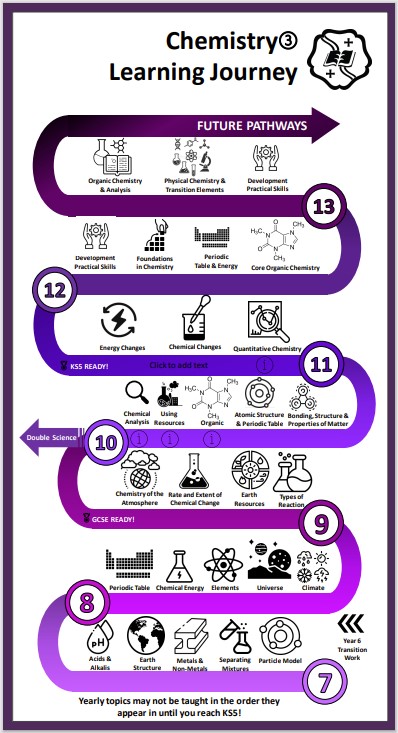To educate,
inspire and promote the understanding of the role Sciences play in human
endeavour. Students will be able to make rational life choices, develop skills
relevant to future careers and contribute meaningfully to a modern society.
Chemistry is divided into topics, each
covering different key concepts. Some topics follow on from the GCSE course
such as quantitative chemistry, electronic structure and bonding. Other new
concepts are also introduced such as enthalpy, isomerism and aromatic
chemistry. This course has a strong mathematical component; approximately 40%
of the course is based upon chemical calculations.
The teaching of practical skills is integrated
with the theoretical topics and they are assessed both through written
examination papers and the practical endorsement. Students will complete
approximately 3 hours of practical work every week. They will be expected to
keep accurate and up-to-date records of practical work in their laboratory
books in order to achieve the final practical endorsement. The learning process
is a blend of dynamic learning styles, including teacher-led sessions and
active learning (e.g. problem solving, peer tutoring, discovery practicals,
student-led sessions, presentations and projects). These maybe accompanied by
field trips and visits to local industries or Universities.
Educate students to acquire a firm understanding of key scientific principles and detailed technical knowledge, opening pathways to Science and technology vocations.
Students will be able to relate technical knowledge to developments in society (eg climate change/sustainable development) Further develop logical thinking and problem-solving skills and scientific literacy. Facilitate extend practical and organisational skills.
Topic areas taught at KS4 will be revisited in each subject’s A Level course in more breadth and depth. As Science is a spiral curriculum this will building upon previous knowledge, content and skills to enhance a greater comprehension and appreciation of Science.
STEM activities at KS5 include; trips to Higher Education providers (eg biomedical imaging, high voltage lab); opportunities to study subjects in ‘the field’ (eg Biology Field Trips, Chemistry work in Southampton University laboratories); Talks by visitors (eg genetic engineering as part of Science week); aspiring medics and vets programme.
Exam Board: OCR
Qualification Title: Chemistry
Qualification Specification Code: H432
Qualification Webpage: Click here to visit the OCR webpage for the specification.
Standard Sixth Form entry requirements, plus GCSE Science grade 6 or above

Chemistry related
degrees, Medicine, Veterinary Sciences, Pharmacology, Biochemistry, Biomedical
Sciences, Engineering, Environmental Science, Forensic Science, Materials
Science, Neuro Science and Scientific Research. Many different careers are
based on STEM (Science, Technology, Engineering and Mathematics) skills.
Employers value people with STEM qualifications and skills, not just for their
specific knowledge but also for their transferable analytical, problem solving
and creative skills. Examples of growth areas for STEM opportunities include
new sustainable Energy Resources, Medicines, Nanotechnology, Space Technology
and Civil and Water Engineering. Many of the challenges facing today’s society
will only be overcome with the help of chemical scientists
Owned by: MDS | Last Published: 20/09/2019 09:53:36 | Next Update: N/A